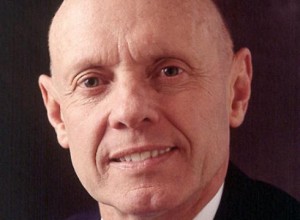Stephen Covey dies at 79
Stephen R. Covey, a former Brigham Young University business professor who blended personal self-help and management theory in a massive bestseller (“The 7 Habits of Highly Effective People”) died Monday at a hospital in Idaho Falls, Idaho. He was 79.
The cause was complications from injuries sustained in a bicycle accident, said Debra Lund, a spokeswoman for the Utah-based FranklinCovey leadership training and consulting company he co-founded.
In April, Covey lost control of his bike while riding down a hill in Provo, Utah. He was hospitalized for two months with a head injury, cracked ribs and a partly collapsed lung but “never fully recovered” – Lund said Monday.
Covey became a household name when “The 7 Habits of Highly Effective People” was published in 1989. On bestseller lists for four years, it has sold in excess of 20 million copies in 40 languages and spawned a multimillion-dollar business empire that markets audiotapes, training seminars and organizing aids aimed at improving personal productivity and professional success.
“His timing was perfect. He really caught the wave … as people were becoming increasingly fascinated with leadership. He addressed ordinary people’s desire to succeed through leadership and management” – said Barbara Kellerman, a lecturer on leadership at the Kennedy School of Government at Harvard University.
Covey’s family issued a statement, reported by CNN affiliate KSL, saying he died from residual effects of an April bicycle accident.
“In his final hours, he was surrounded by his loving wife and each one (of) his children and their spouses, just as he always wanted” – the statement said, according to KSL.
Covey was “one of the world’s foremost leadership authorities, organizational experts and thought leaders,” according to a biography posted on the website of his 2011 book – “The 3rd Alternative.”
Other best-sellers by Covey include “First Things First,” “Principle-Centered Leadership,” and “The 8th Habit: From Effectiveness to Greatness,” according to the biography.
“The 7 Habits of Highly Effective People” has been named one of the most influential management books by several organizations, including Time and Forbes magazines. The audio book is the best-selling nonfiction audio in history, according to the website.
Named in 1996 as one of Time magazine’s 25 most influential Americans, according to the biography, Covey “made teaching principle-centered living and principle-centered leadership his life’s work.”
Utah Gov. Gary Herbert released a statement saying he was “saddened” to hear of the death of Covey, a “good friend.”
“His combination of intellect and empathy made him a truly unique and visionary individual” – Herbert said. “The skills he taught, and importantly, the personal example provided by the life he led, will continue to bless the lives of many. Our hearts go out to his beloved wife Sandra and the entire Covey family.”
Calling Covey a “human-potential guru,” Time magazine in 1996 named him to its list of the 25 most influential people. “The essence of Covey’s message – that self-knowledge and control must precede effective dealings with the world at large – seems unremarkable,” the magazine wrote. To which Covey responded, “What’s common sense just isn’t common practice.”
Covey’s seven “habits” included setting priorities, taking initiative and seeking “win-win” relationships. His 2004 follow-up book, “The 8th Habit: From Effectiveness to Greatness,” urged his many adherents to find their “voice” – their unique mixture of talent, passion, need and conscience – “and inspire others to find theirs.”
Covey was born on October 24, 1932, in Salt Lake City. He earned an undergraduate degree from the University of Utah in 1952, a master’s in business administration from Harvard University in 1957 and a Ph.D. in organizational behavior from Brigham Young University in 1976, according to a 2004 profile in USA Today. He taught at BYU for 24 years.
A devout Mormon, he spent time as a missionary in the U.K. in the 1950s, during which he proselytized on a soapbox in London’s Hyde Park, the newspaper reported. He always denied that religious beliefs, his or any others, were involved in his writings.
With his wife, Sandra, Covey had nine children and, as of 2009, 50 grandchildren, according to a story in the Dallas Morning News.
